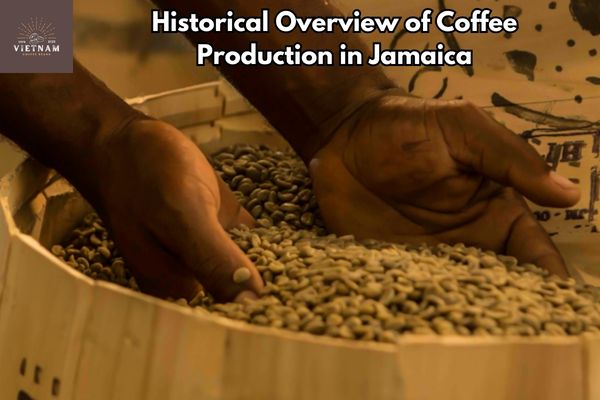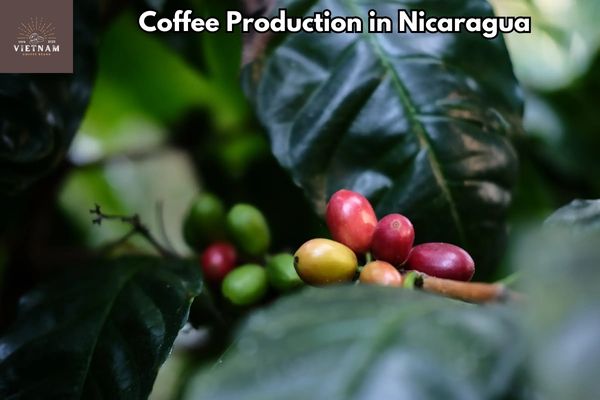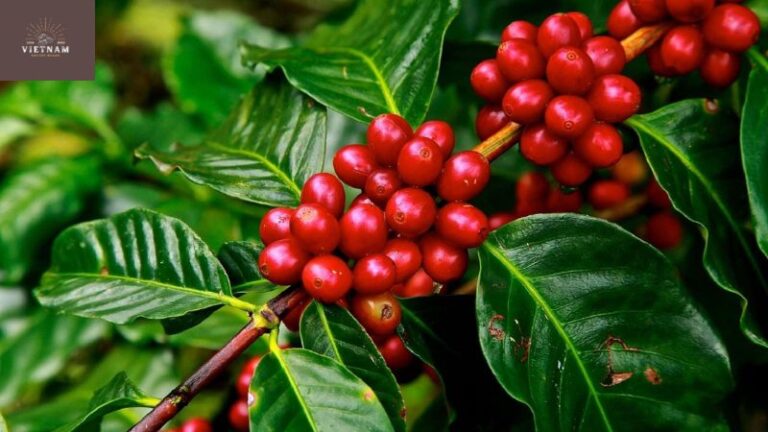I’ve always been fascinated by the world of coffee production, and one country that stands out is Jamaica. With its rich history and unique farming methods, Jamaican coffee has become renowned worldwide.
The majority of coffee grown in Jamaica is Coffea arabica Typica, with other varieties like caturra and geisha also being cultivated. The Ministry of Agriculture and the Jamaica Agricultural Commodities Authority regulate and oversee the coffee sector, ensuring high production and optimum acidity.
In 2013, Jamaican coffee production reached 6,984 tons, making up 0.1% of the world’s coffee production. The demand for Jamaican coffee surpasses its supply, with the majority of Jamaican Blue Mountain Coffee being exported to Japan.
Join me as we explore the fascinating world of coffee production in Jamaica.
Key Takeaways
- Majority of coffee grown in Jamaica is Coffea arabica Typica, with other varieties such as caturra and geisha also grown.
- Coffee is grown at varying elevations and rainfall levels, with farming methods focused on high production and optimum acidity.
- Coffee production in Jamaica is regulated by the Ministry of Agriculture and the Jamaica Agricultural Commodities Authority, with oversight from the Coffee Industry Development Company.
- Jamaican Blue Mountain coffee, which comes from specific parishes, is a highly sought-after variety and over 80% of it is exported to Japan.
Historical Overview of Coffee Production in Jamaica

I learned that coffee production in Jamaica has a rich history dating back to the 18th century. The historical significance of coffee in Jamaica cannot be overstated. It has played a crucial role in shaping the country’s economy and culture.
Coffee plantations were established in the Blue Mountains, taking advantage of the region’s ideal climate and fertile soil. The introduction of coffee cultivation brought a wave of prosperity to Jamaica, attracting both local and international investors. Insights into coffee farming in Sri Lanka can be gained from this, as the country also has a long history of coffee cultivation.
The cultural impact of coffee can be seen in the Jamaican coffee traditions that have been passed down through generations. Coffee has become an integral part of Jamaican identity, with the famous Blue Mountain coffee being celebrated worldwide for its unique flavor and quality.
The history of coffee production in Jamaica is a testament to the country’s dedication to excellence in agriculture and its ability to create products of exceptional quality.
Coffee Varieties and Farming Methods in Jamaica

The coffee varieties and farming methods in Jamaica showcase a meticulous approach to cultivation, drawing inspiration from the rich Colombian coffee origins and cultivation practices, resulting in exquisite Jamaican coffee known for its exceptional flavor and quality.
Coffea arabica Typica is the most commonly grown coffee variety in Jamaica, making up 70% of the yield. Jamaican coffee farming methods are geared towards high production and optimum acidity. The coffee is grown at elevations ranging from 15 to 1,603 meters, with varying rainfall patterns across the island.
Coffee bean processing methods in Jamaica are crucial to achieving the desired flavor profile. The impact of climate change on coffee production is a growing concern in Jamaica and around the world. Rising temperatures, changing rainfall patterns, and increased incidence of pests and diseases pose significant challenges to coffee farmers.
Efforts are underway to adapt farming practices and develop resilient coffee varieties to mitigate the effects of climate change. It is essential to prioritize sustainability and support farmers in their efforts to maintain the quality and productivity of Jamaican coffee.
Regulation and Oversight of Coffee Production in Jamaica
The Ministry of Agriculture and the Jamaica Agricultural Commodities Authority oversee the regulation and oversight of the coffee sector in Jamaica. This ensures that the production and distribution of coffee meet the highest standards of quality and sustainability.
The impact of coffee production on local communities is significant, as it provides employment opportunities throughout the production, processing, and sale stages. This not only supports the livelihoods of many individuals but also contributes to the economic growth of the country.
The regulation and oversight of coffee production in Jamaica are informed not only by local practices and traditions but also by valuable Mexican coffee production insights, contributing to the establishment of a robust quality control system and ensuring the continued excellence of Jamaican coffee.
Additionally, the coffee sector in Jamaica is committed to environmental sustainability. Farmers are encouraged to implement farming methods that focus on high production while maintaining optimum acidity levels. This not only ensures the quality of the coffee but also minimizes the negative impact on the environment.
Production Statistics of Jamaican Coffee

Export demand for Jamaican Blue Mountain Coffee exceeds the country’s production capacity, with over 80% of it being exported to Japan. This high demand has had a significant economic impact on Jamaica’s coffee industry.
The production statistics show that Jamaican coffee production in 2013 was 6,984 tons, which may seem small in comparison to world production, but it plays a vital role in the country’s economy. Coffee farming provides employment opportunities throughout the production, processing, and sale stages, contributing to the livelihoods of many Jamaicans.
In order to ensure the sustainability of the industry, Jamaica has implemented various sustainability initiatives. These initiatives focus on promoting environmentally-friendly farming practices and supporting the welfare of coffee farmers. By investing in these sustainability initiatives, Jamaica is not only preserving its unique coffee heritage but also ensuring a prosperous future for its coffee industry.
Coffee cultivation in Nicaragua serves as a compelling point of comparison when exploring the production statistics of Jamaican coffee, as both regions demonstrate the artistry and dedication required to cultivate exquisite coffees that command attention and acclaim in the global market.
Economic Impact of Coffee Production in Jamaica
Growing and selling coffee in Jamaica has had a significant economic impact on the country, benefiting both the local economy and the livelihoods of many Jamaicans. The coffee industry in Jamaica has been a major contributor to the country’s GDP, providing employment opportunities and generating revenue through exports.
Additionally, the sustainable farming practices implemented by coffee growers have helped preserve the natural environment and promote long-term sustainability. The table below highlights some of the economic benefits and sustainability initiatives associated with coffee production in Jamaica.
| Economic Benefits | Sustainability Initiatives |
|---|---|
| – Boosts local economy | – Adoption of shade-grown coffee |
| – Creates employment | – Implementation of organic farming methods |
| – Generates export revenue | – Preservation of biodiversity |
The economic benefits of coffee production extend beyond financial gains, as it also contributes to the preservation of the environment and the well-being of local communities.
Through sustainability initiatives such as shade-grown coffee and organic farming methods, Jamaican coffee farmers are ensuring the long-term viability of their industry while protecting the natural resources that make their coffee unique.
This commitment to sustainability not only benefits the environment but also enhances the reputation and marketability of Jamaican coffee internationally.
Therefore, the economic impact of coffee production in Jamaica goes hand in hand with its sustainability initiatives, creating a win-win situation for the country and its people.
Exploring the coffee industry in Haiti sheds light on the economic impact of coffee production in Jamaica, as both regions demonstrate the immense potential and significance of this thriving agricultural sector in stimulating economic growth and creating sustainable livelihoods.
Export Market for Jamaican Coffee
I am amazed by the high demand for Jamaican coffee in the export market. It’s no surprise that this demand exists, given the exceptional quality of Jamaican coffee and the country’s commitment to sustainability practices.
The Jamaican coffee industry has implemented stringent quality control measures to ensure that only the finest beans make it to the market. Farmers carefully cultivate coffee varieties such as Coffea arabica Typica, caturra, and geisha, focusing on high production and optimum acidity.
The Ministry of Agriculture and the Jamaica Agricultural Commodities Authority oversee the coffee sector, ensuring that sustainable farming methods are followed. Additionally, the export market for Jamaican coffee is thriving, with over 80% of the famous Blue Mountain Coffee being exported to Japan.
This success is a testament to the dedication of Jamaican coffee producers in maintaining both quality and sustainability.
The export market for Jamaican coffee has flourished, attracting global attention for its exceptional quality and distinct flavor profiles, inspiring coffee growers worldwide, including those involved in the process of growing coffee in El Salvador, to strive for similar excellence.
Challenges and Opportunities in Jamaican Coffee Industry
As a coffee industry expert with years of experience, I have witnessed both the challenges and opportunities in the Jamaican coffee industry.
One of the key challenges faced by coffee farmers in Jamaica is the need to implement sustainability initiatives. With increasing concerns about the environmental impact of coffee production, it has become crucial for farmers to adopt sustainable farming practices. This includes practices such as shade-grown cultivation, organic fertilizers, and water conservation techniques.
Another important aspect for the Jamaican coffee industry is market diversification. While Japan has been a significant market for Jamaican Blue Mountain Coffee, it is essential to explore other potential markets to reduce reliance on a single market. By diversifying their market reach, Jamaican coffee producers can mitigate risks and increase their sales opportunities.
In order to address these challenges and seize the opportunities, it is important for the Jamaican coffee industry to collaborate with government agencies, industry associations, and international partners to develop and implement sustainable farming practices and explore new markets for their unique and high-quality coffee.
Future Prospects for Coffee Production in Jamaica
With the implementation of sustainable farming practices and exploration of new markets, the future prospects for coffee production in Jamaica look promising.
Climate change has had a significant impact on coffee production worldwide, and Jamaica is no exception.
However, by adopting sustainable farming practices such as shade-grown techniques and organic fertilizers, farmers in Jamaica are mitigating the effects of climate change and ensuring the long-term viability of their crops.
These practices not only protect the environment but also improve the quality of the coffee beans, resulting in a more desirable product for consumers.
Additionally, the exploration of new markets, particularly in Asia and Europe, provides opportunities for increased demand and higher prices for Jamaican coffee. With these strategies in place, Jamaica is well-positioned to continue its tradition of producing exceptional coffee for years to come.
Frequently Asked Questions
Conclusion
In conclusion, as an experienced coffee enthusiast, I can confidently say that Jamaica has a rich history and a thriving coffee industry.
With its focus on high production and optimum acidity, Jamaican coffee, particularly the renowned Blue Mountain variety, has gained international recognition and demand.
However, there are challenges that the industry faces, such as limited production and the need for sustainable farming practices.
Nevertheless, with the support of regulatory bodies and the growing export market, the future prospects for coffee production in Jamaica are promising.




